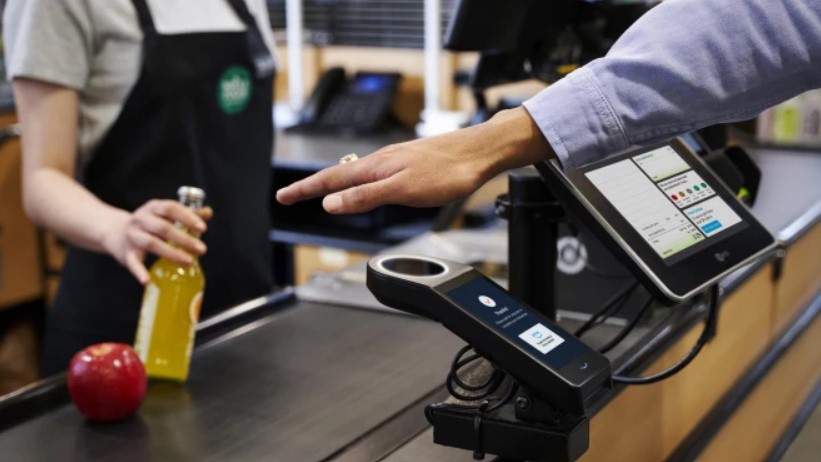Amazon One, the revolutionary palm-scanning payment technology from Amazon, is set to expand significantly across the US. The retail giant recently announced plans to implement the technology in over 500 Amazon-owned Whole Foods Market stores nationwide by the end of the year.
They payment system enables customers to make purchases by simply hovering their palm over a reader device, which identifies their unique palm signature and charges the purchase to the customer’s payment card on file.
Since its launch in 2020, Amazon One has seen wide-scale adoption with its service established in over 400 locations across the US. This milestone achievement, marked by over three million uses, has been possible due to the tech’s adoption in Amazon’s own retail stores as well as various sports stadiums, entertainment venues, travel retailers at numerous American airports and even Panera Bread, thanks to a partnership inked in March 2023.
Related: New Starbucks Concept Store Uses Amazon Go’s ‘Just Walk Out’ Technology
Amazon One has been deployed in various stadiums including Bridgestone Arena, Climate Pledge Arena, Globe Life Field, Lumen Field, T-Mobile Center, T-Mobile Park, NASCAR Raceway and Texas A&M’s Kyle Field, in addition to entertainment venues such as Hollywood Casino at Greektown in Detroit and more.
The payment system has also been making steady inroads into Whole Foods locations, ahead of this expansion announcement. Currently, it is available in over 200 Whole Foods Market stores spread across various US states and is slated to roll out nationwide in the second half of the year.
With Amazon One coming to Whole Foods, shoppers can make purchases without the need for a wallet or phone; all they need is their palm. Prime subscribers who link their Amazon One profile with their Amazon account also stand to benefit from automatic application of savings as a membership perk.
The tech and retail giant has also recently upgraded the Amazon One reader to verify customers’ ages, enabling customers to purchase adult beverages such as beer at sports events by simply hovering their palm over the reader. This feature was first introduced at Coors Field. It remains unclear whether Whole Foods stores will also implement this feature or if customers will need to present their ID to store staff, as is the norm with most other self-checkouts.
To use the payment system, customers can pre-enroll online using their credit or debit card, Amazon account and mobile number. This can be accomplished in about a minute, thanks to Amazon’s partnerships with American Express, Discover, Mastercard, Visa and other major US banks. Customers can then complete their enrollment process when they first scan their palm over a payment system device at a participating Whole Foods location or opt to register at a device in the store.
Amazon insists on the secure storage of customer information in its AWS Cloud, protected by multiple security controls. Instead of using the palm image to identify the customer, Amazon One creates a unique, numerical, vector representation of the palm and underlying vein pattern for identity matching, referred to as a palm “signature.”
Amazon One’s data policy, as outlined in a new FAQ, asserts that palm data will never be shared with third parties, even in response to government demands, unless legally required. It also emphasizes that the unique combination of palm and vein imagery used by Amazon One for recognition makes the data unusable by third parties and unmatchable with data from other sources. The data isn’t used for marketing purposes and won’t be sold or bought by other companies. Amazon also doesn’t track user activities or purchases after entering a third-party location using Amazon One.
However, the payment technology has raised privacy concerns since its inception, leading to one early adopter dropping plans to use the readers after facing pressure from consumer privacy and advocacy groups. Denver Arts and Venues, which had planned to leverage Amazon One for ticketless entry at Red Rocks Amphitheater, ended its association with the retailer after concerns were raised about potential data sharing with government agencies and susceptibility to cloud hacking.
The retail giant faced queries from US senators about its plans with customer biometrics shortly after Amazon One’s launch. Additionally, a recent report suggests that Amazon may be facing a class action lawsuit for allegedly violating a New York City biometric surveillance law related to the use of its Amazon One readers at Amazon Go stores.












Join or login to leave a comment
JOIN LOGIN